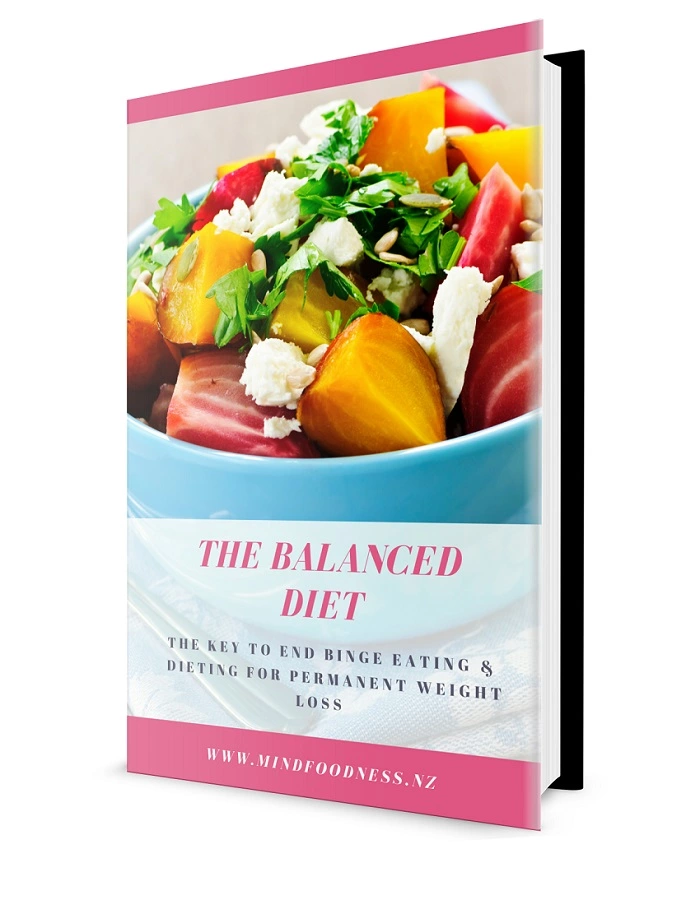Blood sugar imbalance is one of the 6 triggers for binge eating and overeating. This article will first explore what blood sugar imbalance is and how it affects us. Next, I will provide 2 very simple strategies to manage blood sugar (without restrictions or diets). Finally and most importantly, I describe how we can make simple food changes to resolve blood sugar imbalance. I will give specific examples of food combinations to combat this common cause of binge eating.
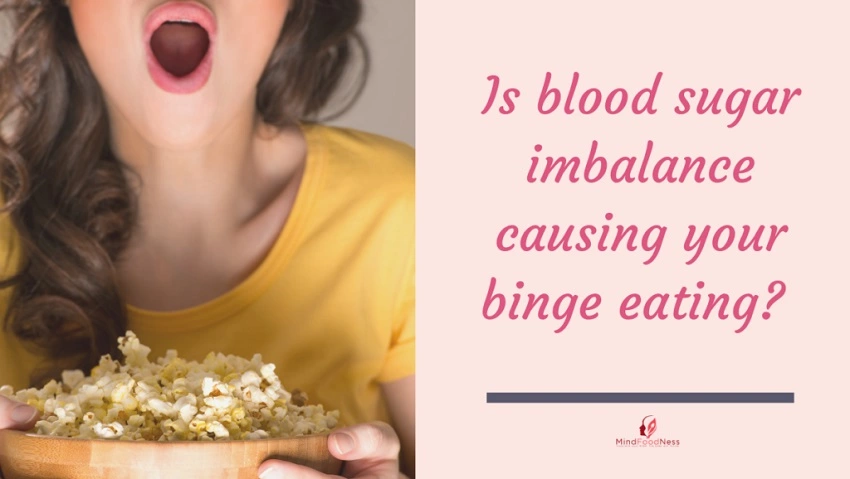
What is your Binge Eating Trigger?
Being a holistic eating psychology coach, I wholeheartedly believe the key to overcoming binge eating is finding our own binge eating triggers. Certainly, it is only when we uncover and address the underlying cause (there could be more than one), that we can finally put an end to the binge/restrict cycle that might have taken control of our life.
Everyone is different; we are complex human beings with different pasts, different circumstances and stories, and physiological make-ups. Having worked now with hundreds of people, I have been able to see a pattern and have determined 6 common reasons for binge eating. Once we are honest with ourselves and manage to peel the layers back, we will identify our own dominant trigger.
Consequently, confronting our triggers becomes part of our healing to create new patterns, new stories and a new relationship to food and eating.

Blood Sugar Imbalance is a Common Trigger
One common trigger of overeating and binge eating is blood sugar imbalance. Symptoms associated with blood sugar imbalance are brain fog, depression, anxiety, cravings, and poor concentration. The blood sugar roller coaster is where blood sugar rises too rapidly (by eating simple or processed carbohydrates/sugars). This rise subsequently produces too much insulin (which is trying to control the glucose), causing the blood sugar to swing back again. We then crave more similar foods. Thus, it becomes a vicious cycle of spikes and crashes.
When your blood sugar is balanced you will most likely feel happy, productive, full of vitality, calm, and find it easier to sleep. Balancing blood sugar can also help with weight loss if this is something you are aiming for.
On the other hand, when your blood sugar is not balanced you are either at a momentary sugar high or experiencing a crash.
How to Know if Your Blood Sugar is Low?
Imagine this. You start your day with white toast with jam, which is simple carbohydrates and sugar. This will spike your blood sugar. Then, it will make a sudden drop, making you hungry and craving something (usually 1 hour later). As a result, we experience a blood sugar crash.
In this state, we are not capable of rationally thinking “Oh, this is my blood sugar dropping”. We suddenly feel uncomfortable and a sensation of “I need something” comes over us. This feeling might create frantic thoughts of “I need food NOW!”. For others, it feels like a mixture of hungry and angry = hangry. Hangry feels like going from just fine to “I’m going to rip someone’s head off if I don’t get something to eat right this minute!”. This is usually when our blood sugar is very low.
After all of these fluctuations, and if we continue our day like this, we might experience some of those symptoms listed earlier (moody, brain fog). Furthermore, it might also lead to nighttime binge. (Yes blood sugar is a huge reason for night binges too!).
So, this is why it is important we eat foods throughout the day that stabilize our blood sugar.

The Glycemic Index (GI) Can be a Useful Tool
It is helpful to become aware of the Glycemic Index which is a numerical ranking (1-100) of carbohydrates in food in relation to how they affect our blood sugar. The lower the GI (or glycemic load), the less it affects blood sugar and insulin levels. For example, a white bagel is high (above 70) on the GI index. As a result, it will raise your blood glucose levels higher and faster compared to foods lower on the index.
It’s not about never eating high GI foods. What is important is being aware of what you are eating and how it might be affecting your blood sugar. It can be a useful concept in making food replacement choices. For instance, having oats instead of cornflakes, or eating whole grain bread instead of white flour bread.
Here is a graphical representation of the different rate low and high GI foods release sugar into the bloodstream.
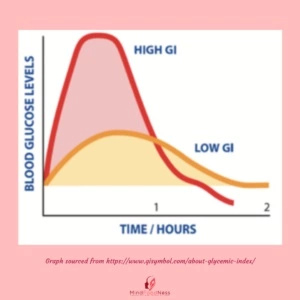
2 Simple Ways to Keep Blood Sugar Stable
1. Balanced Meals
One powerful way to maintain a leveled blood sugar is to ensure your meals are well balanced. By balanced, I mean they should include a form of protein, healthy fats, whole grain carbohydrates, and vegetables. In short, when we combine our food in this way, the glucose from the meal enters our blood slowly, which is what we ultimately want. Most importantly, when we balance our food this way, it helps us avoid the blood sugar roller coaster.

2. Avoid food that spikes your blood sugar
Avoiding foods that spike your blood sugar is useful. For example, obvious culprits include white bread, processed foods, cereal with added sugars, french fries/chips, yogurts with added sugar and sugary drinks. I find it useful to replace these foods with equivalents that are healthier. For instance;
– Cereal, replace with oats
– Yogurt with sugar, replace with unsweetened Greek yogurt
– White bread, replace with grainy or wholemeal
But some of these foods are my favourites! (Yes, I hear you – me too!) Do you find these types of foods are your “go to” binge foods? Do you feel you would struggle to replace these foods with an alternative? Check out my video where I talk about how to stop binge eating sugar, peanut butter, toast, and all those yummy foods.
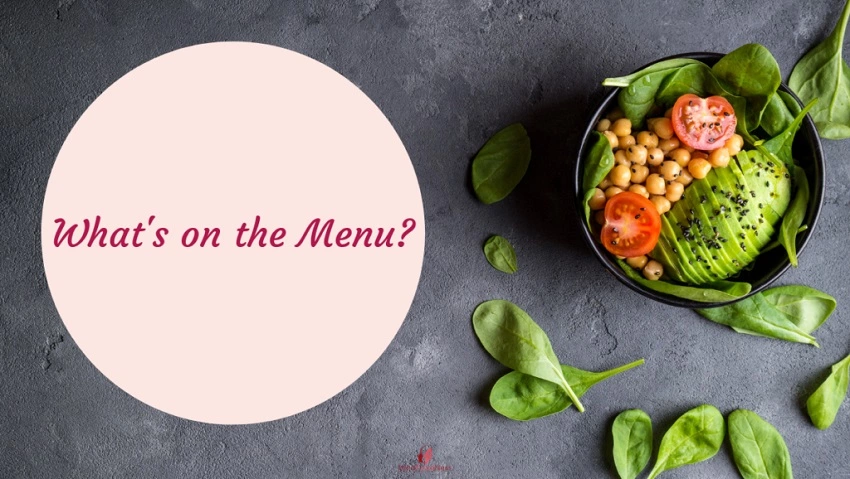
So How do I Combine my Food?
Here is an example of what you could eat in a day that would keep your blood sugar balanced. Starting and finishing your day like this you have more energy, avoid becoming the ‘hangry monster’, and you will crave food less (I promise!).
Breakfast Options
- Wholemeal or grainy toast with butter and a side of eggs
- Porridge with milk (almond, cows, oat), sprinkled with nuts and seeds
(With the oats, I personally like to add a teaspoon of coconut cream to my porridge to give more fat as it helps stabilize my blood sugar, and I can certainly feel the difference)
Snack Options (I suggest protein and fat, or protein and fiber combinations)
- Apple slices with nut butter (almond butter or peanut butter). The butter is a protein and fat and the apple has fiber and tastes good.
- Cottage cheese on rice wafers
- Nuts (a great all-rounder, with fats, protein, and carbohydrates)
Lunch Options (Lunch is where I suggest having the following sizes)
- Carbohydrates (a handful) – brown rice or quinoa
- Protein (palm size) – meat, fish, eggs, tofu, beans, lentils, chickpeas
- Vegetables (fist size) – your favourites
- Fat (thumb size) – food cooked in good oils or butter
Afternoon snack
If you are certain you have blood sugar imbalance, definitely incorporate snacks as this will help with food cravings, especially at night. You can have similar snacks in the morning. For example,
- Celery and nut butter
- Banana and nut butter
- Boiled eggs
- Cottage cheese and rice cakes
- Cottage cheese and rice cakes
Dinner Options
Finally, there are many options for dinner, and most people do this quite well. However, I suggest that unless you are doing significant exercise or have just been to the gym, leave carbohydrates out because you want to avoid a blood sugar spike. Dinner is where you eat vegetables, protein and fats.
- Stir-fried vegetables cooked in healthy fat.
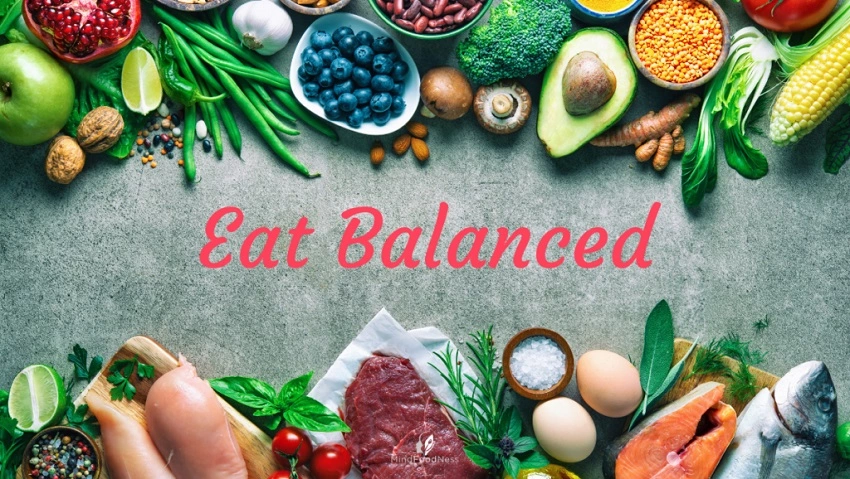
Eat Balanced
Good health is about balance. Essentially, eating meals with the proper proportions of fats, protein, carbohydrates, and vegetables will help you avoid binges, overeating and maintain emotional and physical balance. In this way, it is not about restrictions and having internal battles with yourself.
Even if you do accidentally have a binge one day, I recommend that you do not restrict food intake or start dieting. Simply go back to this balanced approach and your body will naturally become more in tune with what it needs.
You might have other reasons you binge eat. I have 6 listed in another blog- check it out here.
